|
Apple users running MacOSX 10.4 or later must
install Microsoft's Silverlight software in order to view the streaming videos.
Once installed, restart your browser before viewing.
Silverlight 4.0 intel (14MB) |
Silverlight 1.0 ppc (5MB)

WATCH
AND
LISTEN |
shorter |
Taking the Temperature, BBC
This series "focuses on the battle against climate change and the people and
ideas making a difference." Videos and text, wide-ranging topics.
The Measure of a Fog
Ian Cheney, undark.org
This set of short videos offers a condensed and accessible survey of some of
the complexities for humans seeking to understand and solve climate change.
Segments address "Distance," "Carbon," "Energy," "Geoengineering," "Politics,"
and "Ethics," and a "Finale" offers a condensed version of the whole.
(4-13 minutes, 2016-2017)
The Secrets of the "Climate Paradox"
Planet Advocates
A short animated summary of key ideas about the difficulty of thinking about
and acting on climate change. These broadly accepted ideas are, in this case,
drawn from Per Espen Stoknes' book "What We Think About When We Try Not To
Think About Global Warming: Toward a New Psychology of Climate Action."
(8 minutes, July 2015)
Climate Change Stories
Sometimes it is best to hear directly from people who are experiencing climate
change in their own lives and thinking about what to do about it. Several
groups have begun collecting such
stories: "Climate Matters Documoments" for Hawaii;
Climate Minnesota,
Climate Wisconsin,
and
Climate Stories NC
(North Carolina) for
those states; and (for people living around the U.S., including numerous
Native communities, and some from other countries),
the Climate Listening Project,
Americans on the
Front Lines of Climate Change, the
U.S. Climate Resilience Toolkit,
and the
Climate Stories Project.
(varied)
EveryDayClimateChange
Housed on
Instagram and with a good presence on
Facebook, this collection of donated professional photos documents the
actual effects of climate change on people, wildlife, and landscapes around
the world. You can read a story by Katherine Bagley of InsideClimate News
about this initiative
here.
(photos)
CO2 and Climate Calculator with Emission Controls
Model by Scott Denning; video produced by the Fort Collins Sustainability Group
This is an excellent site for anyone who wants to see (in a simple model) how
various dates and rates of decreasing greenhouse gas emissions will affect the
atmospheric concentration of these gases and the ensuing planetary temperature
changes. Easy to use and understand, with help from the embedded video, good
explanations, some real data for those who want to see it, and clear graphics.
The model allows you to set different dates and rates for richer and poorer
countries, as defined by the UN.
(5 minutes)
|
| |
longer |
Climate Change: Simple, Serious, Solvable
Scott Denning, Colorado State University
This three-part talk by (Changing Climates @ Colorado State) climate scientist
Scott Denning is an excellent, super-accessible, and energizing introduction
to the subject. Videotaped by the University of Wisconsin Whitewater in
November 2017, it is divided here into three sections. First, in
"Simple," Denning lays out
the very basic, long-understood reasons the planet is warming from our use of
carbon-based fuels. Second, in
"Serious," he talks about
some of the ways this warming presents serious problems that demand to be
addressed. And finally, in
"Solvable," he offers good
reasons to think we can indeed address them in ways that will improve our
future prospects.
(14-21 minutes, 2017)
Decoding the Weather Machine
Nova, PBS
An excellent overview of climate change, tethered to the changing perceptions
of a weather forecaster, but quite wide-ranging and watchable, with lots of
good scientists interviewed along with compelling real-world visuals.
(1hr 53min, 2018)
Our Year of Extremes: Did Climate Change Just Hit Home?
Ann Curry, NBC News
An excellent feature story about recent extremes (cold in the East, drought
in the Southwest, wildfires, flash floods, Arctic ice melt, Superstorm Sandy)
and their connections with climate change‒considered on the ground,
through interviews with climate scientists and with people who have
experienced these events first-hand.
(42 minutes; also divided into shorter sections, 2014)
|
| READ |
books |
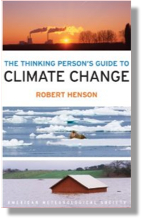 The Thinking Person's Guide to Climate Change
The Thinking Person's Guide to Climate Change
Robert Henson. American Meteorological Society (distributed by the University of Chicago Press), 2014, 416pp.
Formerly The Rough Guide to Climate Change, of which this is essentially the
4th edition, this book is an excellent, highly readable overview, with major
sections on the basics, the
symptoms, the science, debates and solutions, "what you can do," and
resources. A staff writer at the National Center for Atmospheric Research,
NCAR, Henson is a gifted explainer of complicated subjects. He addresses
common questions and confusions, offers vivid examples relevant to everyday
life, includes many photographs, graphs, and other helpful illustrations,
and makes clear where and why scientists are more or less confident about
their data and predictions.
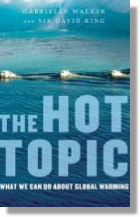 The Hot Topic: What We Can Do about Global Warming
The Hot Topic: What We Can Do about Global Warming
Gabrielle Walker and Sir David King, Harcourt, 2008, 225pp.
With a cool-headed framework emphasizing the urgency of dealing with carbon
emissions, these two distinguished authors offer very clear, readable, and
down-to-earth explanations of critical information first about the problem and
then about technological and political solutions. Although their main focus is
on large-scale solutions, they are also clear about the importance of a wide
range of individual actions. Though naturally it is occasionally a little out
of date, this book remains an excellent primer.
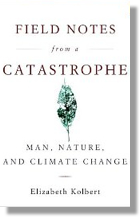 Field Notes from a Catastrophe
Field Notes from a Catastrophe
Elizabeth Kolbert, Bloomsbury, 2006, 192pp.
Perhaps THE best single place to start learning about climate change, this
book (first published as a series of articles for The New Yorker
magazine) offers lucid, compelling stories about the science of and scientists
working on climate change, its current and likely effects on landscapes and
ecosystems, and its impacts on human individuals and cultures. It has justly
been called the Silent Spring for this topic, and for our times.
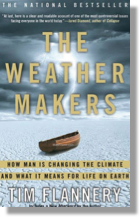 The Weather Makers: How Man Is Changing the Climate and What It Means for Life on Earth
The Weather Makers: How Man Is Changing the Climate and What It Means for Life on Earth
Tim Flannery. Grove Press, 2005, 321 pp plus notes and index.
Australian zoologist, paleontologist, and writer Flannery provides a
well-researched, expansive, lively overview of "the history of climate change,
how it will unfold over the next century, and what we can do about it"--with
particular attention to the effects on living creatures, including people.
Paying more attention to the southern hemisphere than American books typically
provide, and taking advantage of his own scientific training as he works
through information from other specializations, this leading public scientist
puts his story-telling skills to good use in this important and engaging book.
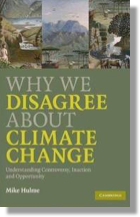 Why We Disagree About Climate Change: Understanding Controversy, Inaction and
Opportunity
Why We Disagree About Climate Change: Understanding Controversy, Inaction and
Opportunity
Mike Hulme. Cambridge University Press, 2009, 432pp.
A smart, thorough, and readable examination of the many reasons we don't agree
about climate change, which Hulme understands as equally a physical and a
social phenomenon "best understood as an idea that binds together the physical
world and our cultural imagination." Looking at this idea from "seven
different standpoints" (science, economics, religion, psychology, media,
development, and governance) the book offers a wealth of references, examples,
and powerful thinking tools. Elucidating many of the fascinating but
deeply challenging reasons that this is such a complicated issue, Hulme, a
prominent English climate scientist with a good deal of experience working at
the science-policy boundary, argues that we can make good use of the problem
as a way of thinking anew about our role in the world.
|
| |
articles & essays |
National Climate Assessment 4, Vol. II: Impacts, Risks and Adaptation in the United States
November, 2018
An essential resource. The latest of these regular, congressionally-mandated
reports collects and contextualizes the work of hundreds of scientists and
thirteen federal agencies. This year's version focuses on regions (rather than
the whole nation); adds chapters on air quality, US international interests,
and complex interactions among parts of the human-climate world; and increases
coverage of the economic impacts of climate change and of risk management.
Begin with the online version of the report itself, by reading
Chapter 1: Overview. Both accessible and packed with information,
including lots of embedded links, this chapter is far more concrete andu
specific than the "Summary Findings" and other front matter. (If you missed
2017's Volume I on the science, you can simply read
Chapter 2: Our Changing Climate in this new report.) For the framing of
reliable climate reporters, see the good summary discussions in the
New York Times, the
Washington Post, and the
Atlantic.
Circle of Blue has a good piece focused on water issues, which are
relevant to all of us. Two good list-like summaries are in
Grist (regional impacts) and
CNN (key takeaways focused on human health).
Finally, if you are a teacher, take a look at the NCA resources assembled by
the
Clean Network.
'A Kind of Dark Realism': Why the Climate Change Problem Is Starting to Look Too Big to Solve
Steven Mufson, Washington Post, December 2018
In the lead-up to the 24th UN climate conference in Poland, a grim picture is
emerging, as this very good, important, but chilling article illustrates. For
two other strong articles along the same lines, see
Climate Change Is More Extensive and Worse than Once Thought, by AP's
Seth Borenstein (November 2018), and Robin McKie's
Portrait of a Planet on the Verge of Climate
Catastrophe in The Guardian (December 2018).
Climate of Change: Six Part Multimedia Series on Global Warming in Asia
The Straits Times, Singapore, October 2018
A rich newspaper series on this topic. Clicking on the photos with the
headlines at this link will take you to the main stories about energy,
mosquitoes and disease, food, extreme weather and refugees, water availability
and drought, and coral reefs, in locations that include not just Singapore,
the newspaper's home, but also South Africa, Australia, India, Indonesia,
Philippines, Vietnam, Myanmar, and Nepal. Relevant, of course, to inhabitants
of this part of the globe, but also a useful primer for those whose
perspective centers on North America and Europe.
Surrendering to Rising Seas
Jen Schwartz, Scientific American, August 2018
This exemplary piece about some reasonably successful managed retreating and
restoration on the New Jersey shore is informed by the lived experience of
residents, local activism, insurance, recovery money, the logistical and
policy complications of buyouts, localized forecasting of sea level rise,
short sales, the West Antarctic ice sheet, satellite data, marsh restoration,
and more.
Our Climate Future Is Actually Our Climate Present
Jon Mooallem, New York Times Magazine, April 2017
This thoughtful and challenging essay is well worth reading and contemplating.
The subtitle suggests its concerns, which touch on art, imagination, emotion,
sea level rise, social injustice, sliding baselines, and human cognition:
"How do we live with the fact that the world we knew is going and, in some
cases, already gone?" Part of an issue of the NYT Magazine focused on climate
change.
The Planet Can't Stand This Presidency
Bill McKibben, New York Times, 2017
The lead piece here by McKibben is political, as the title suggests, though it
keeps a clear focus on the issue of climate action. Posted here because of the
set of short pieces by scientists and journalists that follow on the same
link. These sketches lay out ramifications for several specifics: Hawaiian
honeycreepers (rare island birds), Costa Rican cloud forests, NASA's Clarrio
Mission to measure incoming and outgoing solar radiation, Joshua Trees (a tall
tree-like desert yucca), horseshoe crabs, the Thwaites Glacier on Antarctica,
and an aquifer under California's Mojave Desert.
Let Them Drown: The Violence of Othering in a Warming World
Naomi Klein, London Review of Books, June 2016
This essay connects the dots between the current climate crisis and the
insights of post-colonial theorist Edward Said about war, poverty, racism, and
"othering," which he influentially defined as "disregarding . . . the humanity
of another culture, people or geographical region." Not a quick read, but
thought- and conversation-provoking, especially for post-high-school
classrooms.
Short Answers to Hard Questions About Climate Change
Justin Gillis, New York Times, November 2015
A short, clear, unflinching piece on the title subject from a journalist who
has been following this story for the Times for a long time now.
Climate Change 2014, Intergovernmental Panel on Climate Change (IPCC)
Fifth Assessment Report, Synthesis, November 2014
For a quick summary of this important work on global climate change, in a
user-friendly format, this is the place for the big picture regarding current
and projected changes in climate, effects on humans and other living things,
adaptation possibilities, and the needs for mitigation. Surprisingly readable,
as these reports go, and full of important information, with key graphics
included. To read about how conservative the IPCC tends to be (that is,
underestimating the severity of the problem), see leading climate reporter
Chris Mooney's piece, which focuses on the example of scientific studies
of sea-level rise.
The Turning Point: New Hope for the Climate
Al Gore, Rolling Stone, June 2014
Addressing impressive advances in renewable energy (including its
affordability) energy, the size of the climate problem, and developments on
the policy front, Gore offers a compelling case for eyes-open optimism.
Adapting to a Warmer World: No Going Back
Olive Heffernan, Nature, November 2012
An excellent introduction to adaptation efforts now underway around the world
(both large and small scale, top-down and grassroots), as mitigation efforts
flounder and severe weather events become more frequent and damaging.
Temperature Rising
Justin Gillis, New York Times, 2010-2013
This excellent series looks at "the central arguments in the climate debate"
and the "evidence for global warming and its consequences." Topics range from
paleo clues to sea level futures, melting arctic sea ice to heat waves,
political headwinds to the need for new crop varieties and farming techniques.
|
| |
websites |
53 Sources for Climate Change News
A good annotated list of (and links to) comprehensive sources.
The Weather Channel
This is a steady source of good stories about climate change. See:
The Climate 25, very short interviews with a wide range of people on
subjects including security, economics, science, and global climate change
effects;
United States of Climate Change, a set of 50 state-specific stories; and
Exodus: The Climate Migration Crisis.
Yale Climate Connections
This site continues to expand what it does. The core is a series of punchy
90-second radio podcasts looking at how the climate is changing and how we are
responding to these changes. Other resources of various kinds also appear,
including short annotated bibliographies on very specific topics (ICYMI, a
sibling of this website, 100 Views of Climate Change), annotated (with
publishers' descriptions) bookshelves on broad topics (social sciences,
economics, literature, movies, and so forth), and some feature stories.
Drawdown
The Drawdown Project, 2017
This interesting site accompanies the book of the same name. Representing the
work of many people who set out research the relative benefits of 100 existing
solutions with which we might address climate change, it includes an
intriguing list of
solutions summarized by rank. Would you have guessed that
educating girls and reducing food waste make the top ten along with offshore
wind turbines and solar rooftops and farms?
Climate Changed
Bloomberg.com, 2017
A new (2017) central hub for all the climate-related stories (and short
videos) Bloomberg publishes on this topic. They are many and varied, and of
course often include a financial angle.
India Climate Dialogue
This is an interesting collection of stories about what's happening in
India on the climate change front‒both effects being felt and actions
being taken.
Setting Up the Climate Chessboard
Mark Trexler, GreenBiz, December 2015
An invention of
Climate
Web, this is a clever framework for thinking about the push-pull,
up-and-down, left-hand vs. right-hand dynamics of possible climate actions and
the both-sides-at-once positions so many of us inhabit. Lots of good links.
Keep It in the Ground
The Guardian, 2015
In early 2015, this leading newspaper decided to foreground climate change,
partly with a targeted divestment campaign, partly with increased coverage
overall. The results have been rich: varied, illuminating, appalling,
inspiring, lively, and very well worth the time to explore, with this homepage
as a portal.
Responding to Climate Change (RTCC)
This is "a news and analysis website focused on providing the latest updates
and insight into global low carbon developments." A good place to follow UN
talks, but the content reaches well beyond this important topic, with
interesting stories about policy, business, technology, energy, transport,
living, and nature.
Everything You Need to Know about Global Warming
Brad Plumer, Vox.com, May 2015
This is an excellent primer, with brief, clear answers to 20 key questions
and a wealth of
embedded (and thus easy to use) links to sources. Carefully chosen graphs and
charts, too.
The Climate Desk
You can find many fine articles on a wide range of climate topics at this
site, home to a high-quality "journalistic collaboration dedicated to
exploring the impact‒human, environmental, economic, political‒of
a changing climate." Current partners are The Atlantic, Center for
Investigative Reporting, Grist, The Guardian, Huffington Post, Mother Jones,
Slate, and Wired; the reporters are excellent, as is the writing.
The Conversation
With the tag line "Academic rigour, journalistic flair," this lucid and
interesting site features "news and views, sourced from the academic and
research community and delivered direct to the public"-written by those who
have "proven expertise" on the subject they are addressing, for readers in the
general public. Started in Australia in 2011, and now (in beta, or start-up,
form) for the UK, the site covers climate change, ocean acidification, and
other climate-linked topics. A toggle at the top of the page allows one to
switch between the Australian and the UK versions, which overlap but are not
the same.
Climate Central
One of the best sources around (and a frequent source of stories we post on
this website), this is "An independent organization of leading scientists and
journalists researching and reporting the facts about our changing climate and
its impact on the American public."
Climate News Network
Focused mainly on UK-centered stories and perspectives on a good variety of
topics, this site is run by four veteran journalists who (with no outside
funding) emphasize clarity, facts, and implications. To access all the
stories, and to receive their regular emails, you need to sign up (but it's
free); even without signing up, you can read a good many on the website.
Especially useful for journalists.
The Daily Climate
This organization's free daily e-newsletter collects, culls, summarizes, and
links to high-quality journalism about climate change from around the world,
spanning the political spectrum, "from center right to center left." It also
commissions and publishes articles on the subject. A rich, well-organized
website that can save interested readers a lot of time and trouble.
InsideClimate News
This "non-profit, non-partisan news organization that covers clean energy,
carbon energy, nuclear energy and environmental science‒plus the territory in
between where law, policy and public opinion are shaped" works to "produce
clear, objective stories that give the public and decision-makers the
information they need to navigate the heat and emotion of climate and energy
debates." Topics include tar/oil sands, fracking, climate legislation,
activism, and more; a rich home page offers daily and weekly stories, and you
can sign up for a daily email update.
The Christian Science Monitor: All Global Warming
The Christian Science Monitor is one of the best all-around sources for news
about multiple aspects of climate change, from new scientific data to the
effects on and actions of individuals and communities. Stories cover a wide
range of topics, are highly readable, and generally include good photos. The
paper, which now appears in a large-magazine format every week, is worth
subscribing to (and of course a subscription helps keep good stories coming;
a subscription to the daily e-paper is also available), but the content is
easy to find on the web as well. Content specific to the Christian Science
faith is minimal, but the magazine's commitment to humane thinking is not.
Union of Concerned Scientists‒Global Warming
The Union of Concerned Scientists is a non-profit, science-based organization that works to make good scientific information available, to counteract bad information, and to develop solutions to environmental problems, particularly climate change and related issues like clean energy and safe food. Indeed, they are leaders in the fight against climate change. Their website is a great source of information about climate science, impacts, contrarians, and solutions; they also offer some region-specific information, mostly for the U.S.
United States Global Change Research Program
The United States Global Change Research Program brings together the concerns and research of 13 different agencies: the Departments of Commerce, Defense, Energy, Interior, State, Transportation, Health and Human Services, and Agriculture, NASA, the NSF, the Smithsonian, USAID, and the EPA. Their website is a goldmine of solid information, including downloadable publications such as Climate Literacy: The Essential Principles of Climate Science and (this is particularly good) Global Climate Change Impacts in the United States.
The Center for Climate and Energy Solutions
A key resource from an important provider of good information, this site is
run by the successor to the Pew Center on Global Climate Change, an
"independent, nonpartisan, nonprofit organization" that works to "advance
strong policy and action to address the twin challenges of energy and climate
change." With a pragmatic orientation, the website's main sections are on
policy, energy & technology, science & impacts, and business; it also includes
good sections on extreme weather, communication, options for coal, blogs, and
more.
Climate Change in the West: Hot Times
High County News
The mission of the nonprofit magazine (and media organization) High Country
News is to "inform and inspire people to act on behalf of the West's land,
air, water and inhabitants"-a mission that includes fairly frequent (and
award-winning) investigative articles about climate change that focus on this
large geographical region of the U.S. This link will take you to the part of
HCN's website that highlights climates and climate changes past, present, and
future, with attention to science, management, and our human experiences of
and reactions to a changing landscape.
Solutions Journal
"Bold and innovative ideas for solving the world's integrated ecological,
social, and economic problems"; non-profit, peer-reviewed, and written for
"the lay public." Founders are economist
Robert Costanza, educator David Orr, entrepreneur Paul Hawken, and biologist
John Todd.
Rocky Mountain Climate Organization
Focusing mostly on the interior American West, this coalition works to reduce climate disruption and its effects on this region by bringing people together to act and spreading the word through a series of reports (on the website) on specific topics and places (including several National Parks, from Maine to California) and through an information-packed monthly
newsletter.
|
| TEACH |
resources |
Climate Related Websites
Yale Climate Connections
A useful, "selective" list of websites worth looking at.
Getting the Picture: Our Changing Climate
Earth Vision Institute
Though it is intended mostly for middle and high school students and teachers
(it is aligned with national standards), this well-done interactive art +
science site has things to offer older learners as well, including good short
videos, strong images, clear explanations, and teaching resource links.
Developed in conjunction with photographer James Balog's Extreme Ice Survey
and Jeff Orlowski's film about it, Chasing Ice.
Encyclopedia of Earth/CAMEL
High-level compilation of resources (especially articles, but also some
videos) provided by the Climate, Adaptation, Mitigation, E-Learning (CAMEL)
project from the Council of Environmental Deans and Directors (CEDD) of the
National Council for Science and the Environment. Organized into causes (past,
present, future), consequences (physical world, life and death, humans),
solutions (economics, adaptation, mitigation, policy), actions (individual,
collective).
|
|
|



